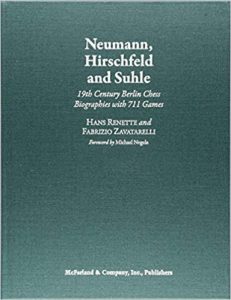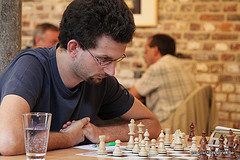
Neumann, Hirschfeld and Suhle : 19th Century Berlin Chess Biographies with 711 Games : Hans Renette & Fabrizio Zavatarelli
Hans Renette

Neumann, Hirschfeld & Suhle. Sounds like a Berlin law firm, doesn’t it? In fact they were 19th century Prussian born chess players with Berlin connections, all active in the 1860s. You tell me you’ve never heard of them? One of them may well be the strongest (for his time) player you’ve never heard of.
Let me take you back to the year 1860. Morphy’s short career in competitive chess had already come to an end, and Steinitz (strange to think he was a year older than Morphy) was just a fairly promising youngster. Anderssen was still active, along with younger players such as Kolisch and Paulsen, but, if you remove Morphy from the equation, there was no clear number one player.
Among those just below the top was (Carl Friedrich) Berthold Suhle (1837-1904), the first of this book’s joint protagonists. Suhle had a very brief chess career spanning the late 1850s up to 1865, when he returned home from Berlin, choosing to focus instead on family life and his career as an academic specialising in Ancient Greek.
Enter Philipp Martin Hirschfeld (1840-96), who, when he arrived in Berlin in 1859, already had a reputation as a theoretician. He was as yet no match for Suhle, though: in a nine game match in 1860 he could only muster two draws. (Note that Jeff Sonas, on his Chessmetrics site, mistakenly dates this match to 1865, causing him to overstate both Hirschfeld’s rating in the early 1860s and Suhle’s rating in the late 1860s.) Like Suhle, Hirschfeld decided to concentrate on his career rather than become a chess professional. Joining his father’s business, he set up a tea company, travelled widely and lived in London through much of the 1870s and 80s. He maintained his interest in chess for the rest of his life but never took part in international tournaments.
The main part of the book is devoted to Gustav Richard Ludwig Neumann (1838-81), who, for a few years round about 1870 was one of the best three or four players in the world. Neumann was a real chess addict who decided to make a living through his favourite game. His first international tournament was Paris 1867, where he finished 4th behind Kolisch, Winawer and Steinitz. Later the same year he won a small but strong tournament in Dundee, this time ahead of Steinitz. It seemed like a new star had arrived, but at the end of 1869 he suffered a mental breakdown and was taken to an asylum. He recovered well enough to be released the following April and that summer resumed his tournament career at Baden-Baden, where he finished 3rd behind Anderssen and Steinitz, and level with Blackburne. Sadly, his mental illness returned at the end of 1872, putting an end to his chess career. Neumann was one of the great might-have-beens of chess, but you’ve probably never heard of him.
The two authors of this volume are both respected chess historians who have written other biographies for McFarland. Hans Renette has penned excellent books on Henry Bird and Louis Paulsen, while Fabrizio Zavatarelli has published a book on Ignaz Kolisch. In 2015 they discovered that Hans was researching Neumann while Fabrizio was studying Suhle and Hirschfeld. Given the overlap in time and place they decided it would make sense to pool their resources.
If you’re familiar with McFarland biographies you’ll know what to expect and won’t be disappointed. A sturdy, large format hardback which will sit impressively on your bookshelf, 711 games with annotations taken from contemporary sources and computer-aided updates from the authors, many atmospheric photographs and outstanding historical research, The English is not always entirely idiomatic, but no matter.
Although the book probably won’t do much to improve your rating, lovers of attacking chess will be delighted to see a lot of Evans Gambit and King’s Gambit games, with the Ruy Lopez in third place. By today’s standards these players were not so strong, but all of us, from Magnus Carlsen down to the humblest patzer, are standing on the shoulders of giants. If you value the history and heritage of our wonderful game you’ll want to find out more about Suhle, Hirschfeld and Neumann, all of whom part of what makes us what we are.
Here’s a crazily complicated game from the book. You’ll have hours of fun spotting the missed opportunities for both players.
Richard James, Twickenham June 7 2019

Book Details :
- Hardcover : 384 pages
- Publisher: McFarland (30 July 2018)
- Language: English
- ISBN-10: 1476673799
- ISBN-13: 978-1476673790
- Product Dimensions: 22.2 x 3.2 x 27.9 cm/li>
Official web site of McFarland Books

